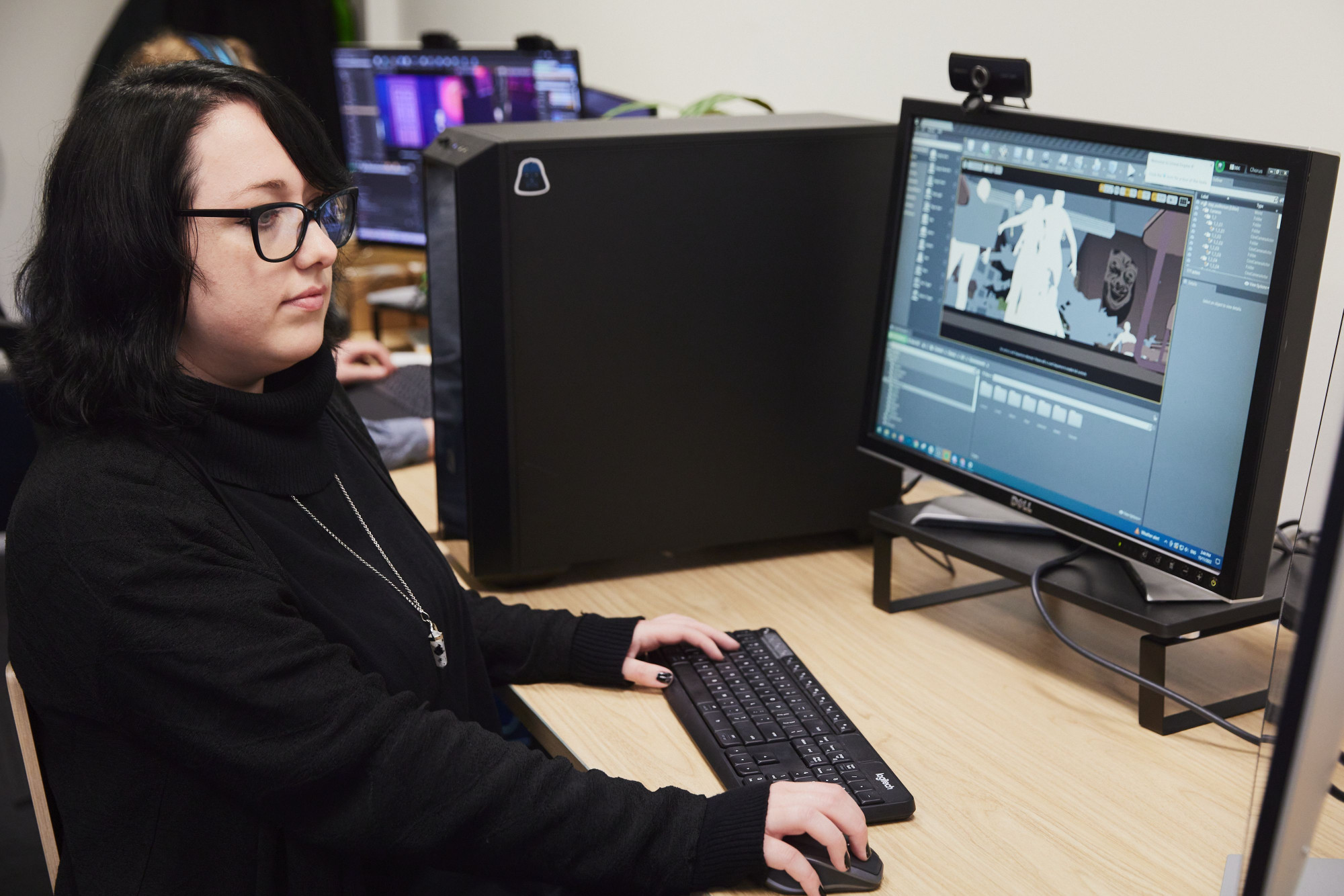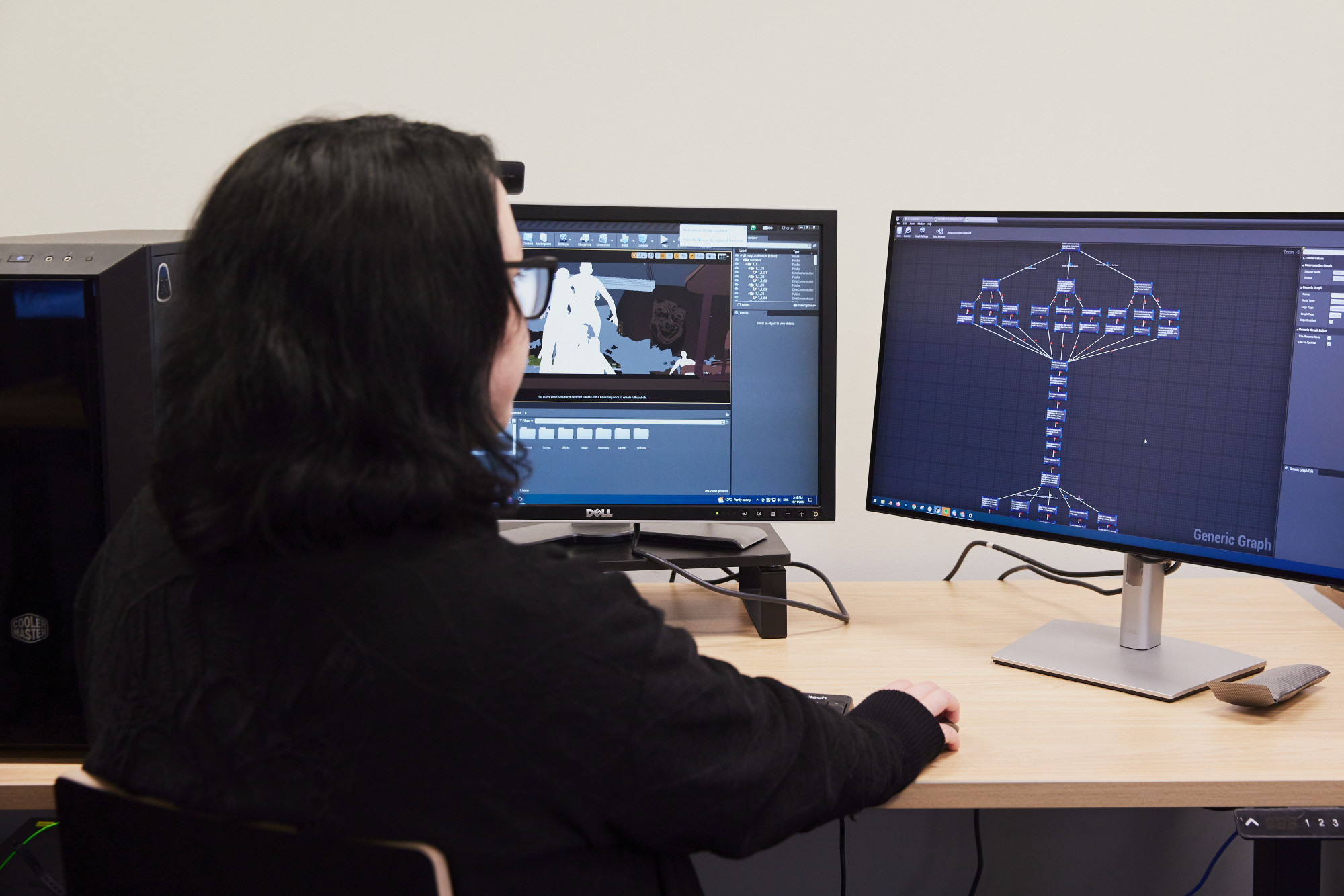News
How Karly Taylor found community at Summerfall Studios

When Karly Taylor first decided to pursue work in digital games, she felt like an outsider. With only her love for creative writing and storytelling in her back pocket, what started as a chance application soon became a viable career move: the VicScreen Specialist Placement Program revealing a clear path to enter the industry.
Months on, Karly’s placement has seen her take on the role of Narrative Designer at independent Melbourne game studio, Summerfall Studios, where she works meticulously on the interactive narrative systems of Stray Gods: The Roleplaying Musical.
A conduit for story and emotional delivery to the player, we caught up with Karly to talk about her work as an early career practitioner in the Victorian games sector.
Hey Karly, thanks so much for chatting! Tell us about your role in Summerfall Studios—how do you contribute to Stray Gods?
As Narrative Designer at Summerfall Studios, I help with a lot of the narrative-oriented aspects of the game. Day-to-day, I work with our Creative Director and Co-Founder David Gaider to further refine the story content that goes into the game: think additional features, expanding lore, and refining the backstory of the Stray Gods universe.
How would you describe the role of a narrative designer?
I’m still learning a lot about this myself. I don’t come from a background in game development and creative writing only scratches the surface. A lot of what a narrative designer does is focus on the overall gameplay experience for the player; looking at how the player can interact with and influence the story so it’s fulfilling and engaging. You don’t just build the world, you also create the mechanics of it too—and for me personally, narrative is a big part of what makes a game memorable.
This is the first game release you’ve worked on. What excites you the most about completing Stray Gods?
I think the most exciting part is seeing how it evolves from where you began with it, whether you were there at its inception or got involved later. It takes a lot of effort to bring a new game to completion, and it’s going to be exciting to see what the end product looks like. It’s a creative project that a team of people have spent a lot of their time working on, and seeing those efforts pay off in getting to watch others experience it for the first time is very exciting.
Your placement was supported by VicScreen’s Specialist Placement program. How has this program set you up for future career endeavours?
This program has set me up for future career endeavours by giving me the opportunity to begin somewhere. By getting my foot in the door with the placement program, I have now begun to build a foundation of networking connections that opens up possibilities for future collaboration and other aspirations, and I will be able to continuously build my skill set in a professional environment.

Karly Taylor at her desk working on narrative design for Stray Gods
What have been your biggest learnings or take-aways from your attachment at Summerfall Studios?
That you will really never stop learning in your career. I have only really just begun my journey, but as the game industry changes and the games we make change, new ideas and possibilities emerge. I think that’s one of the great things about what I’ve learned about the industry through my attachment at Summerfall—that you will never know everything, there’s always room to grow, and that it’s totally okay to make mistakes while you learn—it’s all a part of the process.
Tell us about the community and network you’ve plugged into through this placement?
I’ve met a lot of really cool, talented people since I started my placement, especially while attending GCAP. It has opened a few avenues to exploring potential collaboration with other developers. You’re given a lot of opportunities to expand your network through conventions and workshops. Everybody is very friendly, and you’re all a part of it because you have similar interests. It makes for a very strong, supportive community that opens up lots of different possibilities.
Why should other emerging games practitioners join VicScreen’s Placement Register?
You will be extremely well supported and the placement register is invaluable for emerging games practitioners to gain first-time experience. It is never "too late” to become interested in pursuing a career in games. Applications are treated very fairly and I think anyone who is interested in a career in games but isn’t sure where to start—no matter your level of professional experience—should consider applying.
By creating this opportunity, VicScreen has given me the ability to actually begin working in an industry that I previously believed would be impossible to get into, without having prior experience or connections. I am very grateful for the support from VicScreen to begin a career I have always been interested in pursuing, in a field that I can genuinely say that I love.
Why did you choose to work in the games industry?
I’ve always been a very creative person. I’ve have loved writing and storytelling for as long as I can remember. Playing video games in particular was great for escapism while growing up, and I’m sure a lot of people can relate to that.
As somebody who is neurodivergent and queer, being able to immerse myself in a rich world that was so different to what I knew and let me be an influential part of a story where I felt at home, accepted, and understood was important to me in ways I didn’t fully realise until I was much older.
While working in the games industry is amazing for reasons that would take me a long time to fully explain and I could genuinely go on about it forever, most importantly I think is that I have always wanted to give back that feeling I got from playing those games as an introverted youth.
Tell us about the creativity inside Summerfall Studios. Have you been inspired by the people working around you?
David’s previous work like Playing Dragon Age: Origins was a very big influence on me when I was in high school and it’s how I discovered how artful games storytelling can be. That admiration extends to the entire team—everyone at Summerfall is ridiculously artistic, skilful and knowledgeable people, and because it’s an environment that really fosters and celebrates creativity, you feel inspired by the work of the people around you.
What does the Summerfall Studios team do for team morale and connection?
Without a doubt, Summerfall is one of the most supportive work environments I have ever been a part of. Making Stray Gods has really been a labour of love for everyone involved, and it’s such a huge collaborative effort that has been incredible to be involved with.
What sets Summerfall Studios apart from other small-to-medium sized games studios?
From day one, coming to Summerfall felt like coming into a space where you were all friends working on something cool together. It was made very clear from the start that you were in an environment where you were valued, everyone was there to help you grow and support you. Even though you were coming onto a project that had been in development for a while, you were never made to feel like you were an outsider coming in. I think the strong, uplifting, positive community that Summerfall welcomes you with and has built for itself definitely sets it apart from other studios. I genuinely believe it will continue to develop into something really special over time.
If you are an early-career games practitioner looking to gain valuable hands-on experience, check out VicScreen’s Skills Development program here.
Stray Gods: The Roleplaying Musical is slated to release on PC and can be wishlisted on Steam.